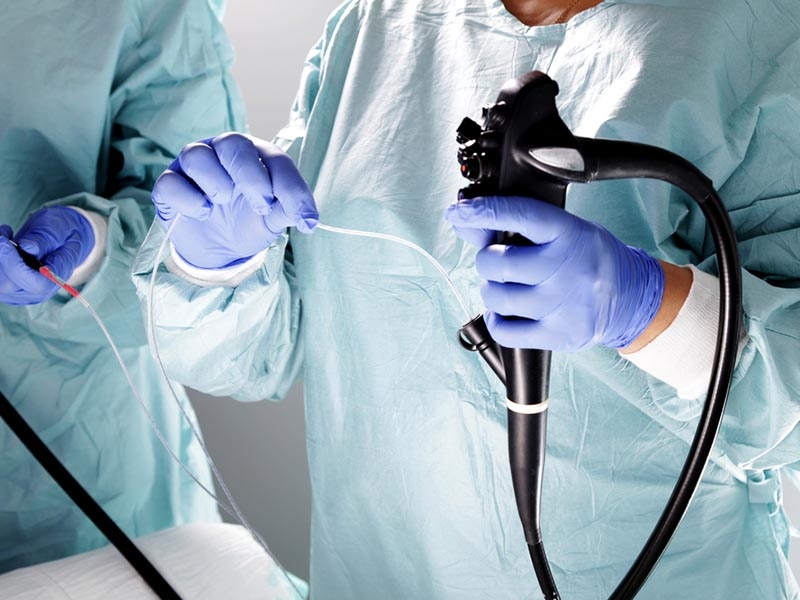
Endoscopy
Watch our video about Endoscopy
What is Endoscopy?
Endoscopy is a medical procedure that involves using a flexible tube with a light and camera (endoscope) to examine the interior of the body. This minimally invasive technique allows doctors to view internal organs and structures in real-time without requiring major surgery. Endoscopy is a versatile diagnostic tool often used to investigate symptoms, diagnose conditions, and sometimes perform minor treatments.
At Clinic Consultation, our state-of-the-art endoscopic equipment ensures precision and comfort during the procedure. Performed by highly skilled specialists, endoscopy provides valuable insights into a wide range of health concerns, enabling prompt and accurate diagnoses.
What is Endoscopy Used For?
Endoscopy serves multiple purposes, including diagnosing, monitoring, and sometimes treating medical conditions. It is commonly used to investigate persistent symptoms, such as abdominal pain, difficulty swallowing, or unexplained bleeding. It can also be employed to take tissue samples (biopsies), remove polyps, or treat bleeding vessels.
Beyond its diagnostic capabilities, endoscopy plays a preventative role in detecting early signs of conditions like cancer. Regular screenings through endoscopy, particularly for high-risk individuals, can lead to early intervention and improved outcomes.
How Does Endoscopy Work?
During an endoscopy, a thin, flexible tube with a camera is gently inserted into the body through a natural opening, such as the mouth or rectum, depending on the area being examined. The camera transmits high-definition images to a monitor, allowing the specialist to observe the targeted area in detail.
The procedure is usually performed under local anaesthesia or sedation to minimise discomfort. It is a quick process, often taking less than 30 minutes, with minimal recovery time required. At Clinic Consultation, our team ensures patient comfort and safety throughout the procedure.
What Are the Types of Endoscopy?
Endoscopy encompasses several types, each tailored to examine specific areas of the body:
Upper Endoscopy (Gastroscopy)
Examines the oesophagus, stomach, and upper part of the small intestine. It is commonly used to diagnose conditions like ulcers, acid reflux, and gastritis.Colonoscopy
Focuses on the large intestine (colon) and rectum. It is essential for detecting polyps, colon cancer, and inflammatory bowel disease.Sigmoidoscopy
Similar to a colonoscopy but limited to the sigmoid colon and rectum. It is often used for detecting lower bowel conditions.Bronchoscopy
Examines the airways and lungs, helping to diagnose infections, tumours, or blockages in the respiratory system.Capsule Endoscopy
Involves swallowing a small capsule equipped with a camera to capture images of the digestive tract, particularly the small intestine.Cystoscopy
Inspects the bladder and urethra, commonly used for diagnosing urinary tract conditions.Arthroscopy
Examines joints like the knee or shoulder, helping to diagnose and sometimes treat joint conditions.
Each type of endoscopy is performed by a specialist with expertise in the relevant area, ensuring precise diagnosis and care.
What Conditions Can Be Detected Through Endoscopy?
Endoscopy can detect a wide range of conditions, including:
Gastroesophageal Reflux Disease (GERD)
Identifies damage caused by stomach acid in the oesophagus.Peptic Ulcers
Detects sores in the stomach lining or duodenum.Colon Polyps
Identifies and removes abnormal growths in the colon, which can reduce cancer risk.Inflammatory Bowel Disease (IBD)
Diagnoses conditions like Crohn's disease and ulcerative colitis.Barrett's Oesophagus
Detects precancerous changes in the oesophagus.Lung Tumours or Infections
Bronchoscopy helps diagnose cancers or infections in the respiratory system.Bladder Tumours
Identifies abnormal growths in the bladder through cystoscopy.
When is Endoscopy Indicated?
Endoscopy is recommended in the following situations:
Persistent Abdominal Pain
Helps diagnose conditions like ulcers or gastritis causing chronic discomfort.Unexplained Weight Loss
Evaluates potential gastrointestinal or metabolic causes.Difficulty Swallowing (Dysphagia)
Investigates blockages or inflammation in the oesophagus.Rectal Bleeding or Blood in Stool
Identifies sources of bleeding in the digestive tract, such as haemorrhoids or polyps.Chronic Cough or Respiratory Issues
Diagnoses lung or airway conditions causing persistent symptoms.Screening for Cancer
Recommended for high-risk individuals or as part of regular preventive care.Monitoring Chronic Conditions
Used to track progress in conditions like IBD or GERD.
Pre- and Post-Endoscopy Care
Before the Procedure:
- Follow fasting instructions as directed.
- Inform your doctor about medications and allergies.
- Arrange for someone to drive you home if sedation is used.
After the Procedure:
- Rest until the sedation wears off.
- Avoid heavy meals or strenuous activities for 24 hours.
- Monitor for any unusual symptoms, such as severe pain or bleeding, and report them to your doctor immediately.
At Clinic Consultation, we ensure patients receive clear instructions and support before and after their procedure.
What Are the Contraindications for Endoscopy?
Endoscopy is generally safe, but certain conditions may pose risks, such as:
- Severe heart or lung disease.
- Recent gastrointestinal surgery.
- Pregnancy (in some cases, depending on the type of endoscopy).
- Uncontrolled bleeding disorders.
Your doctor will evaluate your medical history to determine if endoscopy is appropriate for you.
Alternatives to Endoscopy
For patients unable to undergo endoscopy, alternative diagnostic tools include:
- Ultrasound: Visualises internal organs without requiring invasive procedures.
- CT Scan: Provides detailed imaging of the digestive or respiratory system.
- MRI: Offers high-resolution images of soft tissues.
- Stool Tests: Detects infections or blood in the digestive tract.
These options are less invasive but may not provide the same level of detail as endoscopy.
Book Your Endoscopy at Clinic Consultation
Endoscopy is a safe and effective diagnostic tool available at Clinic Consultation, performed by experienced specialists using the latest technology. Schedule your appointment online today to prioritise your health and well-being.
Click here to schedule an appointment online